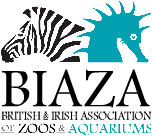British and Irish Association of Zoos and Aquariums

The British and Irish Association of Zoos and Aquariums (BIAZA) (formerly the Federation of Zoological Gardens of Great Britain and Ireland)is the professional body representing over 100 of the best zoos and aquariums in Britain and Ireland.[1] [2] [3] [4]
BIAZA members must do more than simply comply with zoo legislation, they must also comply with more stringent BIAZA codes of practice, as well as undertaking significant work in the field of animal welfare, conservation, education and research.
BIAZA Conservation
BIAZA members make significant contributions to field conservation. Together they support over 700 field conservation projects contributing over £11 million per year. Members supply skills, staff and equipment for wildlife conservation, and essential materials for education and awareness programmes in developing countries. They also play an important role in conservation awareness-raising in the UK, support conservation campaigns and facilitate career development of young conservationists.
BIAZA Education
More than 22 million people visit BIAZA collections every year including 1.5 million children on organized education trips. BIAZA strongly encourages its members in developing an effective education system aiming to conserve the natural world in a number of ways by:
• Motivating people to change their habits.
• Inspiring people to get involved with conservation.
• Encouraging people to donate to particular conservation programmes.
BIAZA collections complete over 800 research projects per year, aiming to provide unique lifelong learning opportunities, to raise awareness, to increase respect and knowledge about wildlife and global issues, and thus to engage and connect people of all ages with the natural world.
BIAZA Research
Research in BIAZA zoos and aquariums is driven and governed by one main goal; to gather knowledge that benefits the conservation of threatened species through welfare, education and a good day out. Modern zoos and aquariums offer scientists unique opportunities to study the biology of animals housed there. Often these animals are extremely elusive and threatened in the wild. Therefore undertaking research in a zoo can take advantage of a significant opportunity to study factors important to conservation, which cannot be undertaken effectively in the wild.
A significant number of zoo animals housed within the UK are part of European breeding programmes (EEPs) which aim to preserve threatened species for the future by pairing compatible individuals. This creates self-sustaining populations, meaning that there is no need to bring in animals from the wild. Because of the importance of these programmes a great number of scientific studies are dedicated to understanding the reproductive biology and needs of our animals.
BIAZA are members of the World Association of Zoos and Aquariums (WAZA) and the European Association of Zoos and Aquaria (EAZA).
References
- ↑ "British and Irish Association of Zoos and Aquariums". biaza.org.uk. Retrieved 7 March 2014.
- ↑ "Members : WAZA : World Association of Zoos and Aquariums". waza.org. Retrieved 7 March 2014.
- ↑ "British and Irish Association of Zoos and Aquariums". nationalfamilyweek.co.uk. Retrieved 7 March 2014.
- ↑ "Specialist Wildlife Services - Information". specialistwildlifeservices.org. Retrieved 7 March 2014.
External links
| ||||||||||||||||||||||||||
| ||||||||||||||||||||||||||||||